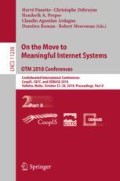Abstract
This paper describes a data governance knowledge extraction prototype for Slack channels based on an OWL ontology abstracted from the Collibra data governance operating model and the application of statistical techniques for named entity recognition. This addresses the need to convert unstructured information flows about data assets in an organisation into structured knowledge that can easily be queried for data governance. The abstract nature of the data governance entities to be detected and the informal language of the Slack channel increased the knowledge extraction challenge. In evaluation, the system identified entities in a Slack channel with precision but low recall. This has shown that it is possible to identify data assets and data management tasks in a Slack channel so this is a fruitful topic for further research.
This research has received funding from the ADAPT Centre for Digital Content Technology, funded under the SFI Research Centres Programme (Grant 13/RC/2106) and co-funded by the European Regional Development Fund.
Access this chapter
Tax calculation will be finalised at checkout
Purchases are for personal use only
References
Attard, J., Brennan, R.: A semantic data value vocabulary supporting data value assessment and measurement integration. In: Proceedings of 20th International Conference on Enterprise Information Systems, pp. 133–144. INSTICC, SciTePress (2018)
Augenstein, I., Das, M., Riedel, S., Vikraman, L., McCallum, A.: Semeval 2017 task 10: scienceIE-extracting keyphrases and relations from scientific publications. arXiv preprint arXiv:1704.02853 (2017)
Cherry, C., Guo, H.: The unreasonable effectiveness of word representations for Twitter named entity recognition. In: Proceedings of 2015 Conference of the North American Chapter of the Association for Computational Linguistics: Human Language Technologies, pp. 735–745 (2015)
De Leenheer, P., Debruyne, C., Peeters, J.: Towards social performance indicators for community-based ontology evolution. In: Workshop on Collaborative Construction, Management and Linking of Structured Knowledge at ISWC (2009)
Derczynski, L., et al.: Analysis of named entity recognition and linking for tweets. Inf. Process. Manag. 51(2), 32–49 (2015)
Finkel, J.R., Grenager, T., Manning, C.: Incorporating non-local information into information extraction systems by Gibbs sampling. In: Proceedings of 43rd Annual Meeting of the Association for Computational Linguistics, pp. 363–370 (2005)
Lebo, T., et al.: PROV-O: the PROV ontology. Technical report (2012). http://www.w3.org/TR/prov-o/
Maldonado, A., et al.: Detection of verbal multi-word expressions via conditional random fields with syntactic dependency features and semantic re-ranking. In: Proceedings of 13th Workshop on Multiword Expressions, Valencia, pp. 114–120 (2017)
Manning, C.D., Surdeanu, M., Bauer, J., Finkel, J., Bethard, S.J., McClosky, D.: The Stanford CoreNLP natural language processing toolkit. In: Association for Computational Linguistics (ACL) System Demonstrations, pp. 55–60 (2014)
Moore, G.: Systems of engagement and the future of enterprise IT - a sea change in enterprise IT. Technical report, AIIM, Silver Spring, Maryland (2011)
Shah, J.: Utilizing natural language processing and artificial intelligence to identify plausible data requests on slack and linking it to Collibras system of record tool DGC. Technical report, Collibra (2017)
Author information
Authors and Affiliations
Corresponding author
Editor information
Editors and Affiliations
Rights and permissions
Copyright information
© 2018 Springer Nature Switzerland AG
About this paper
Cite this paper
Brennan, R., Quigley, S., De Leenheer, P., Maldonado, A. (2018). Automatic Extraction of Data Governance Knowledge from Slack Chat Channels. In: Panetto, H., Debruyne, C., Proper, H., Ardagna, C., Roman, D., Meersman, R. (eds) On the Move to Meaningful Internet Systems. OTM 2018 Conferences. OTM 2018. Lecture Notes in Computer Science(), vol 11230. Springer, Cham. https://doi.org/10.1007/978-3-030-02671-4_34
Download citation
DOI: https://doi.org/10.1007/978-3-030-02671-4_34
Published:
Publisher Name: Springer, Cham
Print ISBN: 978-3-030-02670-7
Online ISBN: 978-3-030-02671-4
eBook Packages: Computer ScienceComputer Science (R0)

